How Daily Tai Chi Practice Saved My Life

Transcript edited and condensed for clarity
Chi Force instructor, Alan Bandes stars on Talk with TQ, an Energy Stoners™ podcast by Toni Quest.
Toni: Today, I’m really very privileged to have a person I admire so much, and consider a good friend of mine. His name is Alan Bandes. He’s actually a Tai Chi master and I’ve seen him in action. He always has this quintessential kind of calm, easy going way. He’s always peaceful to be around and I’m very lucky to have him on the show today. So Alan, welcome to TQ, I’m so happy to see you.
Alan: Thank you, Toni. It’s good to be here.
Toni: So tell me, how’s it going these days? I know you as a Tai Chi specialist in my mind. I’ve taken a class with you once or twice. We won’t get into how I did in that class but it was an experience that I appreciated very, very much. If there’s time at the end, you can talk about that. What impresses me so much about you is that you teach by default. I find that when I’m around you, you tend to be like this quintessential, unintentional educator. Now when I first saw you in action, before I took your classes, I understood that you worked with special groups of people. You worked with the veterans and I know my audience would be really interested to know how you got involved in Tai Chi, and how you ended up working with the veterans for as long as you did.
Alan: Well, I not only work with veterans, I also work with a group called Support Connection which is an amazing organization. It’s a support group for women with breast and ovarian cancer, and hopefully you never know how hard it is to make adjustments physically as well as emotionally. This amazing group of women are trying their best and they are doing very, very well. So I work with them, and of course, I worked at the VA Center for a little bit, and I’ve had some veterans working in my classes that I hold over in Peekskill, NY. All in all, I hate to just categorize, “you have cancer,” or “you’re a vet and you might have PTSD (post traumatic stress disorder). You’re a person and you’re different from anybody else because you are who you are, and so my approach is always the same to people. I try to listen to them, observe them, and see what they are trying to learn. I ask questions a lot as you might recall, and make adjustments when needed, and teach.
It goes a long way now on how I got started. It’s a long, long story of 45 years or more actually.
Toni: Wow, that’s a long time.
Tai Chi an exercise that you just don’t understand how good you feel when you are through with it
Alan: I’ll try to condense. Basically, I started out with starting my own business with two other partners, and as any of you who are entrepreneurs realize, there’s a lot of stress involved, especially when you are going from zero to one—and traveling, being away from your family, doing your best to promote, and try to get people to understand and recognize your product is worth something for them. I had a friend out on the west coast who kept saying, “oh, you got to try Tai Chi” and I kept saying, “west coast, you know B.S.” So it happened one day, I stayed there for a weekend and he insisted I go to one of his classes and I said, why not? I used to be a jogger; I went to the gym and did cardio and all that other stuff, and I figured okay, I’ll give it a shot. And I went to the class, and Toni, literally it blew me away. I couldn’t believe people were getting benefits from the slow, graceful movement. What the heck was going on there? And then the teacher said “come on, try it.” OK, I tried it, and he made some suggestions. He made me do it following along with the class, and at the end, I was smitten. I absolutely said, I gotta learn this.
So I went back to New York, and condensing this, I have gone through three different types of instructors, different styles, and of course each instructor has their own style as well—and I learned from there on in. The beauty of it, and what helped me was that a) it gave me peace of mind b) it was an exercise that you just don’t understand how good you feel when you are through with it, and how it stays with you through the day, through the week, etc., c) and the other thing that was great for me was when I was traveling, I didn’t need any special equipment. I didn’t need to put on sneakers. I remember jogging in Korea once where it had a lot of hills and polluted air, and I’m out there breathing this air and breathing heavily, and I’m saying to myself, “what the hell am I doing?” So I didn’t have to do that anymore.
I continued with Tai Chi. I got up in the morning, and I’d do some meditation. I start with some warm-ups and then I’d do a form. There are different types of forms, which are a number of movements that are connected for a purpose. And so by doing that, it helped me through a lot of stress, not only emotionally and physically, but traveling as you know. When you are going from New York to China, or Japan, there’s sometimes a 12 or 13 hour difference. You go to Australia and there is an almost 24 hour difference, and so when you are waking up in the morning there, it’s your evening here. You have to train your body to adjust, and be able to talk to people intelligently.
Toni: It sounds like it’s beyond jetlag.
Alan: It’s dealing with jetlag and learning how to adapt to it, and I set up a whole Tai Chi routine and it helped me tremendously.
The significance of Tai Chi’s slow movement
Toni: Explain to me about the significance of the slow movement as opposed to the pounding of running, and the intense weight training that many of us do. I’ve experienced it to an extent, and it’s amazing but I don’t understand why.
Alan: Well, you know that’s actually a very deep question that you could write a book on. If you think about it as an example, Tai Chi is partially a martial art. It started out as a martial art. If you throw a punch and throw it incorrectly and make contact, you may break your wrist, and hurt your elbow or shoulder. There are a lot of things that can go wrong if you do it wrong. So if you start to analyze and throw it very, very slowly, and listen to your body, you will see there are a myriad of things that are happening. It’s the way your feet are planted, the way your hips and waist are rotating, and how the alignment between the shoulder, hip, knee, foot, elbow, and the wrist joint all align. And if you do it fast, you’ll never get it. But if you do it slowly and adjust your mind to listen to your body and realize, “oh, I’m raising my shoulder,” you know you’re going to hurt it, and need to let the shoulder drop. Or if I’m bending my wrist, and it’s not straight, and other things like this, you become aware of what you are doing.
So it’s through the slowness that you adjust and make perfect. And then the axiom is that out of slowness comes speed, and you can do it really quick. In Tai Chi, there is an expression we call fajin which is an expression of energy, and it’s very powerful, but you can only reach this powerful state if you’re learning how to have relaxed energy. So you relax your body while you are letting the energy flow. There are benefits as a martial artist, but there are also benefits for everyday life. As an example, there are statistics out there that say for adults over 50, one of the biggest causes of stress and physical injury—possibly even death—is the problem of falling. It’s balance, so if you fall, you know how to adjust to it so you don’t break that wrist, or hit your head and get a concussion. What Tai Chi does is give you stability.
Getting back to that expression, “listen to your body,” you are constantly learning, and by focusing, and letting your mind open and feel, and not think, you feel the adjustments. And by working on this over and over, you create a sense of awareness, and balance, and strength. You can get strength out of weightlifting. You can get a lot of stretching and looseness out of yoga, and a lot of other exercises. But Tai Chi to me, and I’m prejudiced because I’ve been doing this for 45 or 46 years, Tai Chi is a godsend. I’m just so fortunate to have not only learned about it, but embraced it and used it. I use it in my everyday life. When I was in business, I learned how to negotiate using a concept we call yielding. There are so many things that go on that benefit me, and benefit my life.
What makes Tai Chi a martial art?
Toni: The impression I have of Tai Chi, and I know I’ve talked to you about Qigong as well, is it’s interesting how these practices adjust other things in your life by default. I find that if you do practice something like this particular martial art, it looks like dance, and I like to watch it because it’s beautiful to watch. It really is so gorgeous to watch. It seems like by default you might get yourself in a situation, I won’t go into specifics, that you find because you’ve been taught certain slower movements, they almost actually become like reflexes which are faster. And you can find your way getting yourself out of the situation without even making contact, which leads me to the real definition. This is a martial art. What makes Tai Chi a martial art? A lot of people really don’t understand what a martial art is.
Alan: You have to understand its origins. It goes back well over 600 years in a time when China was in an upheaval, where there were different forces fighting each other. There was the Qin Dynasty that was trying to control everything, and you had bandits and marauders and things of this nature. It’s a big country with billions of people, and in this particular area where it was developed, there has always been some form of martial art. As a matter of fact, the original form, Chen style which is what I study, was developed in Chen Village which is a day’s walk from the famous Shaolin Temple. And there were others around there too. And so these people not only learned how to defend themselves from marauders and everything else, but they worked sometimes individually and sometimes collectively to make themselves better and better. It’s kind of like right now, it’s almost football season and in the preseason you had some cases where different teams would work with each other. They’d make it a game but at the same time, the individuals would learn how to adjust to other individuals. So that was one of the aspects; it became a martial art.
Now over time, the Chen style was so effective that they actually hired Chen practitioners as guards for the Silk Road. So caravans would hire these people as basically hired guns, because they recognized the effectiveness of their style. However, what we have discovered over the last century or so, is the benefit of not only practicing it slowly, but getting the benefits of Traditional Chinese Medicine, which works on the balance of yin and yang. Too much yin, you have this problem, or too much yang, you got that problem, etc. And there are different meridians that the energy flows through. There are actually different types of energy in their theory, and so when you’re working on Tai Chi, you are working on different forms of energy that flow, that develop your mind, your body, and your spirit.
Toni: And that’s the thing that really impresses me about it. I guess you have to experience the martial art to an extent to really understand how even if you took a couple of classes, certain things stick with you. And very often I’ve heard that people who are into martial arts, they actually have to register as a lethal weapon themselves although the objective is not to have confrontation.
Alan: Right.
Toni: So it can make you more peaceful.
Alan: You keep mentioning slow movement, and basically what I tell my students is you don’t have to come here (as a martial artist). You know, at my age and a lot of people I work with are in their 50’s, 60’s, 70’s, and 80’s, we are not going to be Bruce Lee jumping around doing somersaults, kicking people in the air. So there’s a point where you adjust and that’s this concept of yielding I was talking about, but I’ll get back to that in a second. So let me just cover the slow movement part. The slow movement as you heard me say allows you to listen to your body, to make the adjustments. We don’t focus as much on breathing when we are doing it because you just want to breathe naturally, and it’s through the slow movement that you are adjusting. There are transitions. So as an example, if you’ve ever looked at the yin yang symbol, there’s a dark and a light.
The concept is, there are opposites. One does not stop; one moves into the other, and moves back into what it was. There’s this constant unity of yin and yang. They overlap. They don’t stop. There’s emotions continuous so when you are moving, if you do it slowly, you get to understand that concept of beginning, middle, and transitioning to beginning. It affects your balance, alignment, and it opens up the different meridians so that the liver meridian can function, the heart meridian can function, the lung meridian can function all as a unit, and you don’t even realize you are doing this. And so you are moving energy and you don’t have to think about it; you’re just doing it, and you have so many health benefits from it. So that’s another thing I tell my students, you can take it on any level you want. You can take it for balance, stability, to prevent falling. You can take it for generic health. You can take it for just feeling mentally good, spiritually good, or improving your memory.
Toni: Tell me how that works.
Alan: It’s the concept you hear so often, mindfulness. This was something they’ve been doing well for over 600 years. If you are not in the present, you’re going to get lost because of these forms I was telling you about. These movements have similarities from one to the other as you’re moving along, and if you’re not focused, you’re starting back at the beginning, or you get lost and mess up. So you have to be mindful of what you’re doing. The other thing it does is help you become—again a lot of times you’re not aware of it—aligned while you’re moving. Your mind is engaged in what you are doing, but because your mind is engaged, your senses are expanded so that you are using peripheral vision, and have a sense of where you are in the moment. We have an expression, listen behind you. Now, you don’t have your eyes in the back of your head unless you’re a mother.
Toni: (laughing) I had a childhood. That’s all I can say. I can remember that.
Alan: We couldn’t understand why Mom knew this, but the point is you become aware of your environment. You become aware of who you are, where you are within time and space as you’re moving. And so it gives you so many benefits that translate to when you leave the studio, or when you are walking around in your daily life. You just find that it expands your mind, it improves your health, and of course, your stability, balance, and confidence.
Toni: Confidence is a big one.
Alan: You’re doing as I said earlier, you’re learning how to improve mind, body, spirit, and how to meld them together. So that’s what you are doing with it.
I firmly believe Tai Chi saved my life.
Toni: And the effect is long lasting. Now, I’m going to share with your permission that you recently had some major surgery, and you shared with me that your doctors were very impressed with your physical fitness.
Alan: I don’t mind. I’ll tell you two things. First of all, I’m a human. I’m not Superman. I’m a person like everybody else.
Toni: No, I’m disillusioned. (laughing)
Alan: But I’m also lucky, and to me learning Tai Chi was a benefit. I firmly believe Tai Chi saved my life.
Toni: Oh, tell me why you believe that.
Alan: I had two incidents. Well, now look, right now I’m 79.
Toni: Congratulations.
Alan: And I can still take my palms, bend over, and touch both palms on the floor. I’m flexible, I have balance, etc. So I’ve been doing Tai Chi for a long time. The first incident, when COVID first came out, if you remember that was the time where you’re trying to get the vaccine and it was like a game of whack-a-mole. You’d try this site and they’d have a date you selected, and “oh, sorry it’s full.” You couldn’t get the vaccination, and I was very unfortunate because I couldn’t get it, and I wound up getting COVID.
Toni: Oh, sorry about that.
Alan: I didn’t realize how sick I was. I had to go to the hospital two times. I had a doctor when I got over it looking at all my results and my bloodwork. He was looking at it and he said, “it affected your kidneys, your liver, your lungs, your bone marrow.” He says, “with everything I’m looking at, you shouldn’t be here. You must be doing something right.” And I firmly believe that was because of the condition I had created for myself by practicing Tai Chi every day. The next incident was the surgery. This was 2 years later, so just to let you know, I had post-COVID anemia and my hemoglobin levels were not the greatest. However, they were improving, and at my age you collect doctors. In any event, my GP was looking at stuff and said, “we have to do more exams.” He had me meet a heart guy, and the heart guy was looking at it and said, “okay, do you have any family history?” I say, “my brother has a pacemaker and a stent. My father’s younger brother had a pacemaker and a stent. My first cousin…you know, it’s a familial thing.” And the guy said, “I thought so. You have a high build up of calcium in your veins, and in your arteries in your heart. And my suggestion is that while you are still healthy, have a bypass.” I thought about it for a long time because who wants to have a bypass.
Toni: A bypass surgery is a big surgery.
Alan: It’s a big surgery, but they kept insisting. Every doctor I visited said in your condition, this is the best thing for you now. You don’t want to come back when you’re really sick, or if you have a stroke. Having witnessed some people who have had strokes, believe me, that scared the heck out of me when they said that. So I said, let’s get this done. I had the procedure done, and I was getting ready to go home when they came in and said you’re going to the ICU. I said, “what’s going on?” I was bleeding internally and they couldn’t figure out why. It turned out, and this is interesting because I didn’t know such a condition could be there, I had this very large ulcer. I said, “I never felt that before the operation.” And he said it was a stress-related ulcer. I said, “I’m not stressed out,” and the doctor said, “no, this is physical stress. You had this stress from a cut in your body, when they ripped you apart, and when they went in, your body reacted to it the way a lot of people don’t react to it. But your body did.” In investigating this further, I also found out I had calcium build ups in another part of my body. It just made sense. My body was in a weakened state and I didn’t know it. Of course, my body reacted. And I wound up being in the hospital for a month. It was horrible; I wouldn’t wish it on my worst enemy. It was absolutly horrible, and torture. However, that was the bad news. The good news is I saw another doctor following up, checking me up, looking at all my vitals, and the guy didn’t know what I did. He said, again, “I don’t know what you are doing, but whatever you are doing, you gotta keep doing it because if you weren’t in the shape you were in, you’d be dead.” That really woke me up. So to me, not only is my study of Tai Chi a benefit and a blessing, but it saved my life.
Toni: I’m glad. I don’t want to lose any more friends to some disease, or to some condition. I’m glad you’re still around. I want my audience to know how they can get involved in Tai Chi before we close this out. I think it’s really important.
Alan: Well, first of all, you’re developing three different energy flows. There’s the jing, qi, and the shen. It relates to mind, body, spirit. Your qi is your natural energy. Your jing is the energy that you have as yourself, what makes you you. And the shen is the spirit. And you’re melding them together. Now, in terms of your question, you should research because you want to make sure. It’s just like you are going to a doctor and you want to make sure that doctor isn’t the one that just says, “here, take 2 aspirins and call me in the morning.”
Toni: There are a lot of those.
Alan: You want to research it. There are different styles, so you want to find one that is more comfortable for you. Some people just teach it totally as a form of meditation and on the other extreme, they teach it only as a martial art; and there’s in between. It’s what you want to get out of it first of all. Secondly, research the teacher/instructor. There are people that have studios, and I don’t do this for a living. I do it because I love doing it, so I teach out of love. I only do it basically because I’m retired now. I do it one day a week, and I love my students, but I have a life.
Toni: And you’re doing really well, and you’re healthy, and every time I see you, you’re smiling. That’s key to me. Aand we started off with mind, body, spirit, and so we can close this out on mind, body, spirit. You’ll have to promise me you’ll come back, and we will talk more about the qi. How can someone get in touch with you if they want?
Alan: Two ways. My teacher, Master Ren Guangyi, is working with me on this, and we developed a program that starts with people that have no experience. So we have a Fundamentals course, then we have an in-between, and then we have form studies, so people can get on it and choose whatever they want from the comfort of their own home at Chiforce.com. If people want to attend my class, it’s in Peakskill, NY at the Go No Sen Karate studio. I teach Monday evenings at 7:30PM to supposedly 8:30PM but it usually goes on to 9PM.
Toni: Thank you, Alan. This was great. Thank you so much.
Alan: I had a lot of fun. Thanks,
Toni: So did I, and I feel like I’ve just done some Tai Chi of the mind. Keeps you peaceful.
About the Author: Alan Bandes has been teaching Chen Style Tai Chi for over 2 decades while studying under Master Ren Guangyi. He teaches in-person, and as an instructor for Chi Force Community where he offers live-streamed classes.

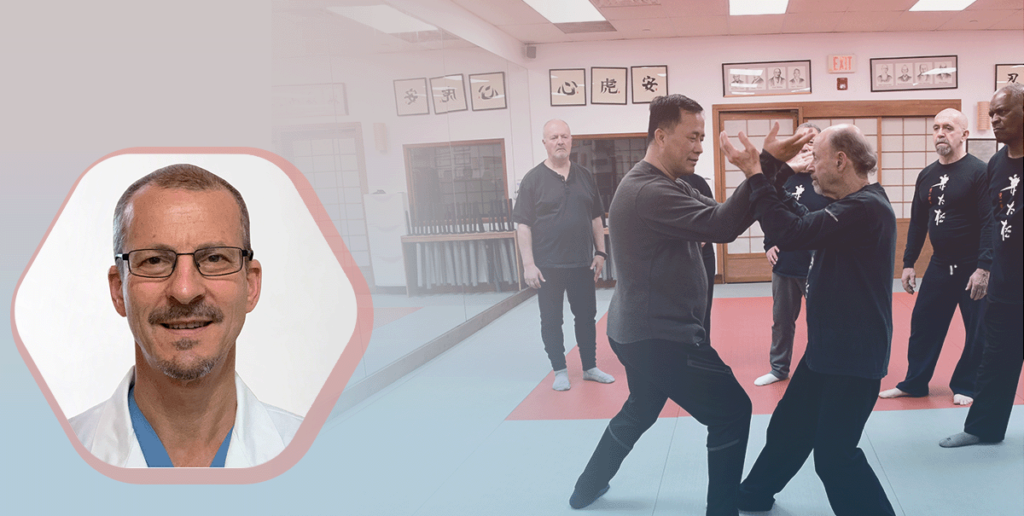
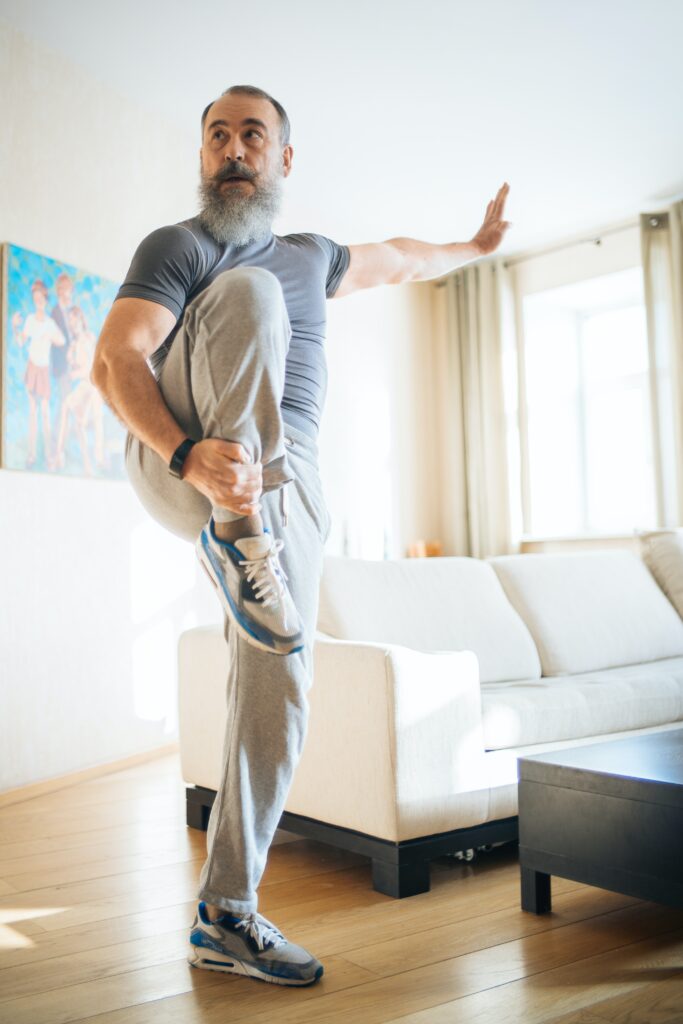
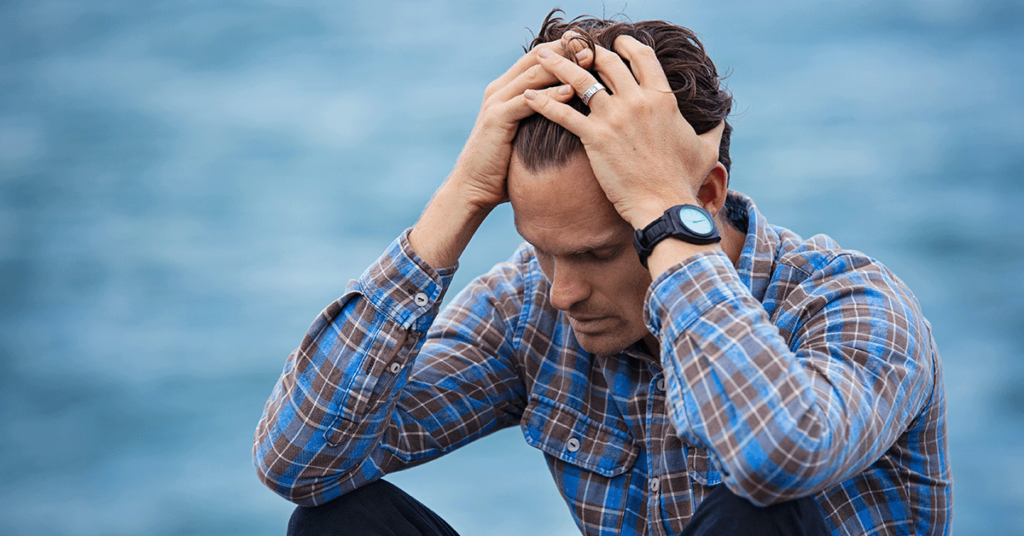
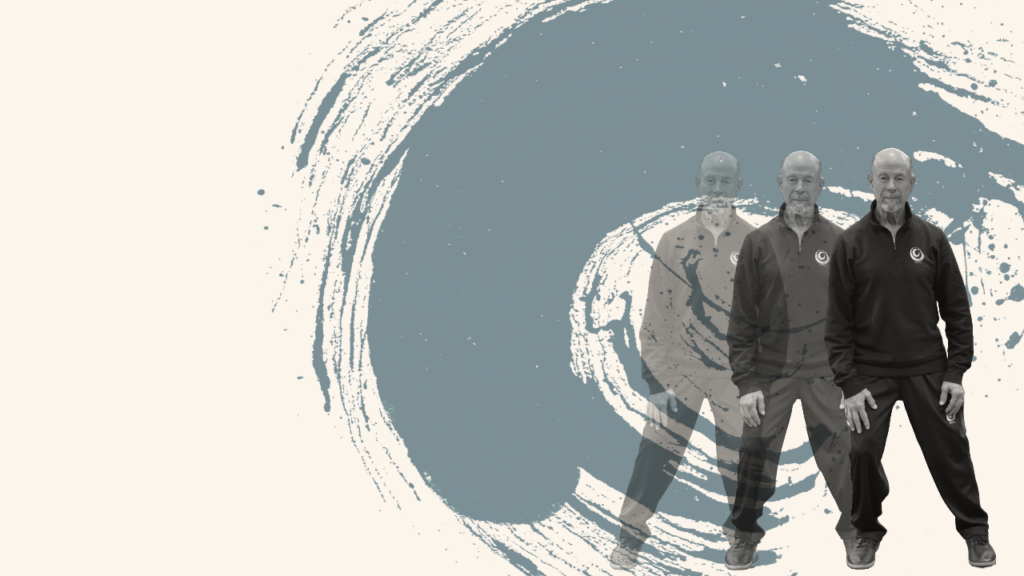
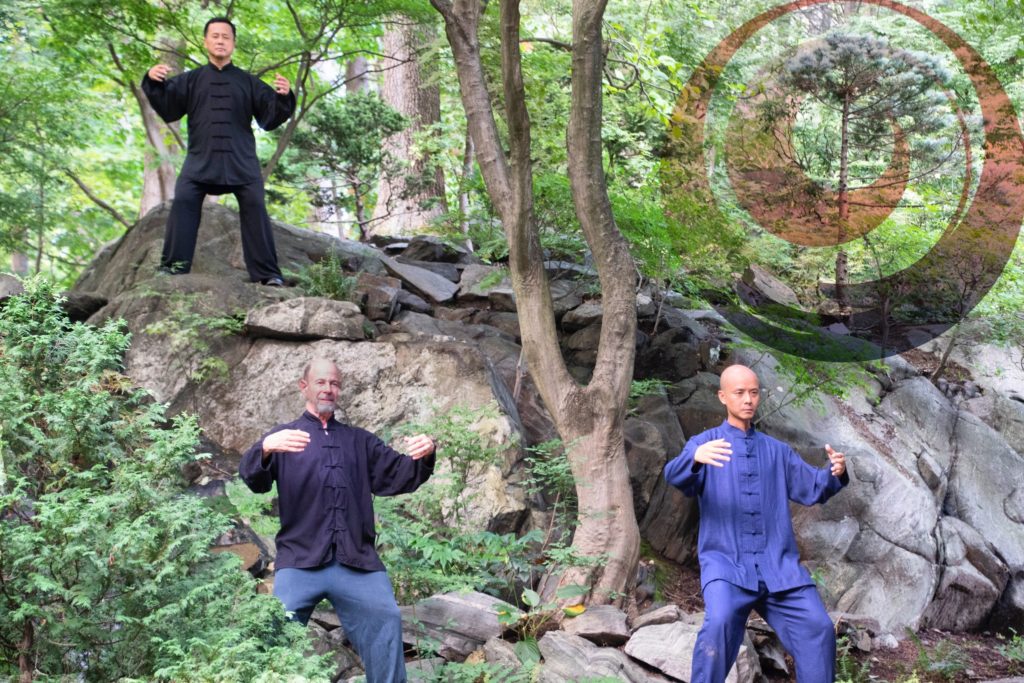

Responses